Understanding Global Business Environment (UGBE) Module CW1 Project
VerifiedAdded on 2023/01/19
|11
|2991
|57
Project
AI Summary
This project, a student's response to the UGBE module's CW1 assignment, delves into key business functions within the context of the global business environment. The assignment is divided into two main sections. The first section analyzes the purpose and value of two distinct business functions: marketing within the event industry and logistics and supply chain management within the hospitality sector. It explores how these functions interrelate with other parts of the value chain, supported by academic sources. The second section focuses on personal learning and development gained throughout the module, including insights from a business simulation, and outlines areas for future development in business acumen and etiquette, incorporating reflection and academic references.

Understanding the Global Business Environment - Project CW1
Instructions
This is part 1 of a 2 part assessment. You must pass both parts (CW1 & CW2) of the
assessment to achieve an overall pass grade on the module. One part does not compensate for
the other if you do not achieve a minimum of 40% pass on both parts.
Part 1 (CW1) is worth 70% of your total module grade
Please follow the instructions below and use the templates to present your work.
Instructions
This is part 1 of a 2 part assessment. You must pass both parts (CW1 & CW2) of the
assessment to achieve an overall pass grade on the module. One part does not compensate for
the other if you do not achieve a minimum of 40% pass on both parts.
Part 1 (CW1) is worth 70% of your total module grade
Please follow the instructions below and use the templates to present your work.
Paraphrase This Document
Need a fresh take? Get an instant paraphrase of this document with our AI Paraphraser
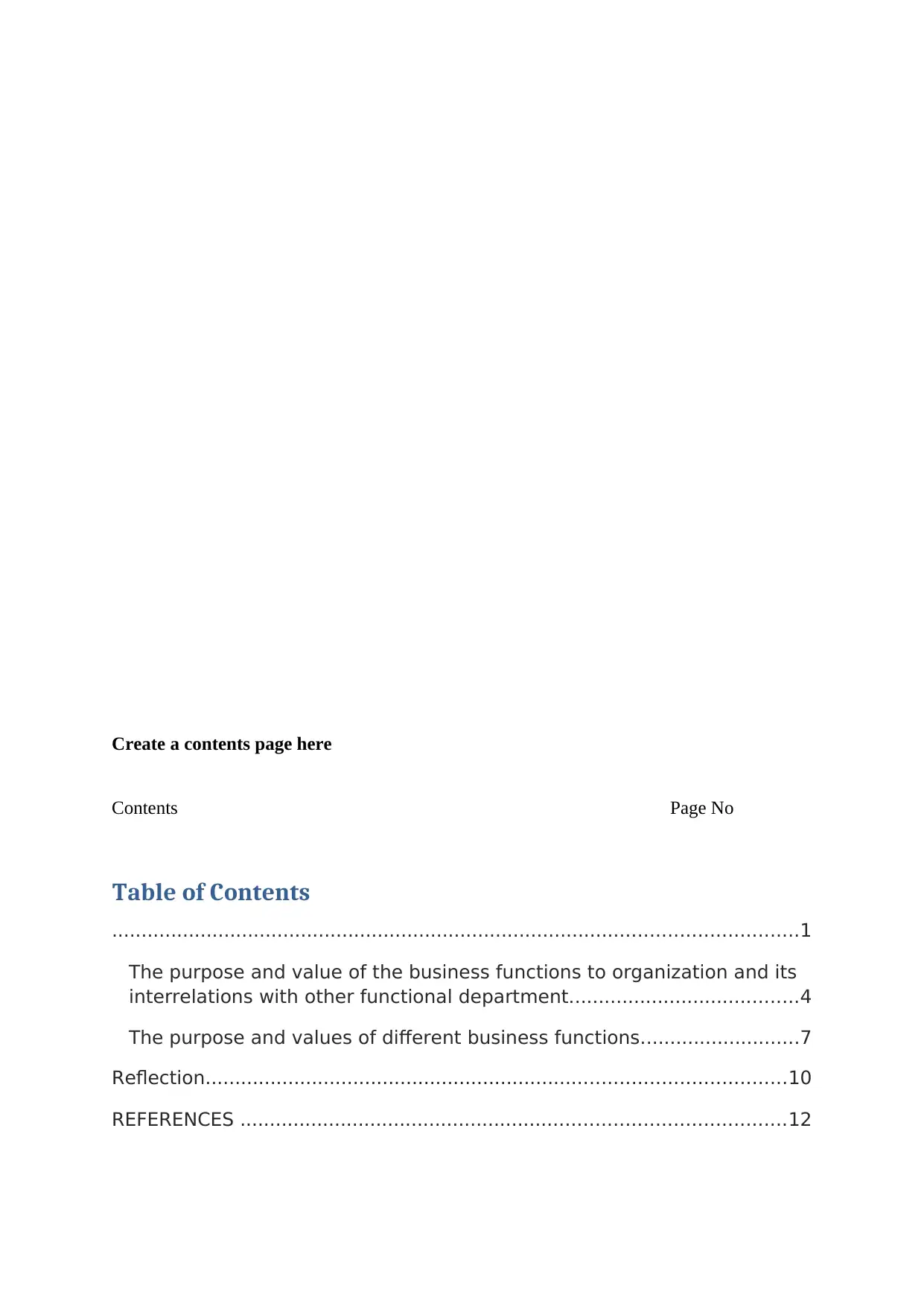
Create a contents page here
Contents Page No
Table of Contents
....................................................................................................................1
The purpose and value of the business functions to organization and its
interrelations with other functional department.......................................4
The purpose and values of different business functions...........................7
Reflection..................................................................................................10
REFERENCES ............................................................................................12
Contents Page No
Table of Contents
....................................................................................................................1
The purpose and value of the business functions to organization and its
interrelations with other functional department.......................................4
The purpose and values of different business functions...........................7
Reflection..................................................................................................10
REFERENCES ............................................................................................12
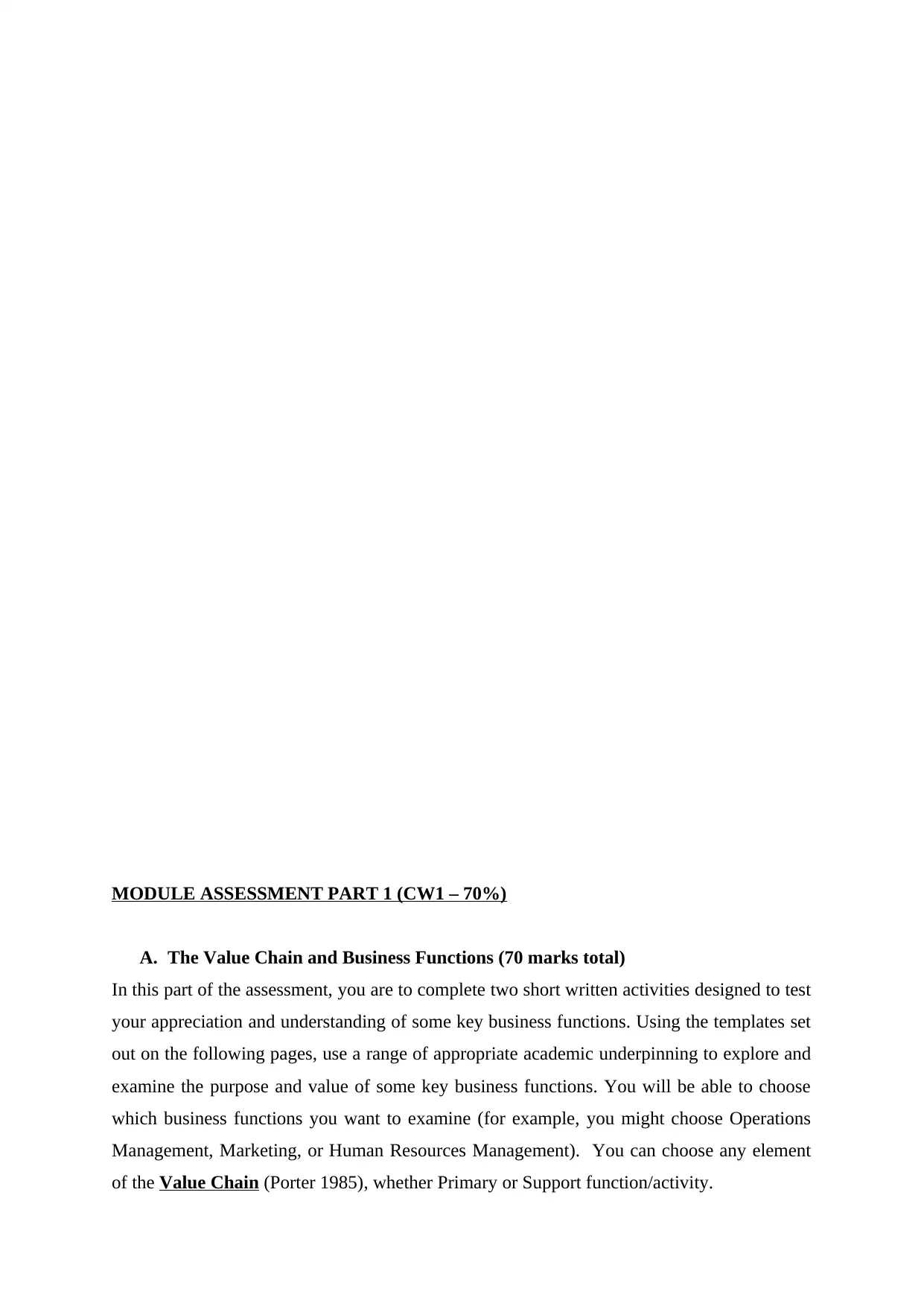
MODULE ASSESSMENT PART 1 (CW1 – 70%)
A. The Value Chain and Business Functions (70 marks total)
In this part of the assessment, you are to complete two short written activities designed to test
your appreciation and understanding of some key business functions. Using the templates set
out on the following pages, use a range of appropriate academic underpinning to explore and
examine the purpose and value of some key business functions. You will be able to choose
which business functions you want to examine (for example, you might choose Operations
Management, Marketing, or Human Resources Management). You can choose any element
of the Value Chain (Porter 1985), whether Primary or Support function/activity.
A. The Value Chain and Business Functions (70 marks total)
In this part of the assessment, you are to complete two short written activities designed to test
your appreciation and understanding of some key business functions. Using the templates set
out on the following pages, use a range of appropriate academic underpinning to explore and
examine the purpose and value of some key business functions. You will be able to choose
which business functions you want to examine (for example, you might choose Operations
Management, Marketing, or Human Resources Management). You can choose any element
of the Value Chain (Porter 1985), whether Primary or Support function/activity.
⊘ This is a preview!⊘
Do you want full access?
Subscribe today to unlock all pages.

Trusted by 1+ million students worldwide
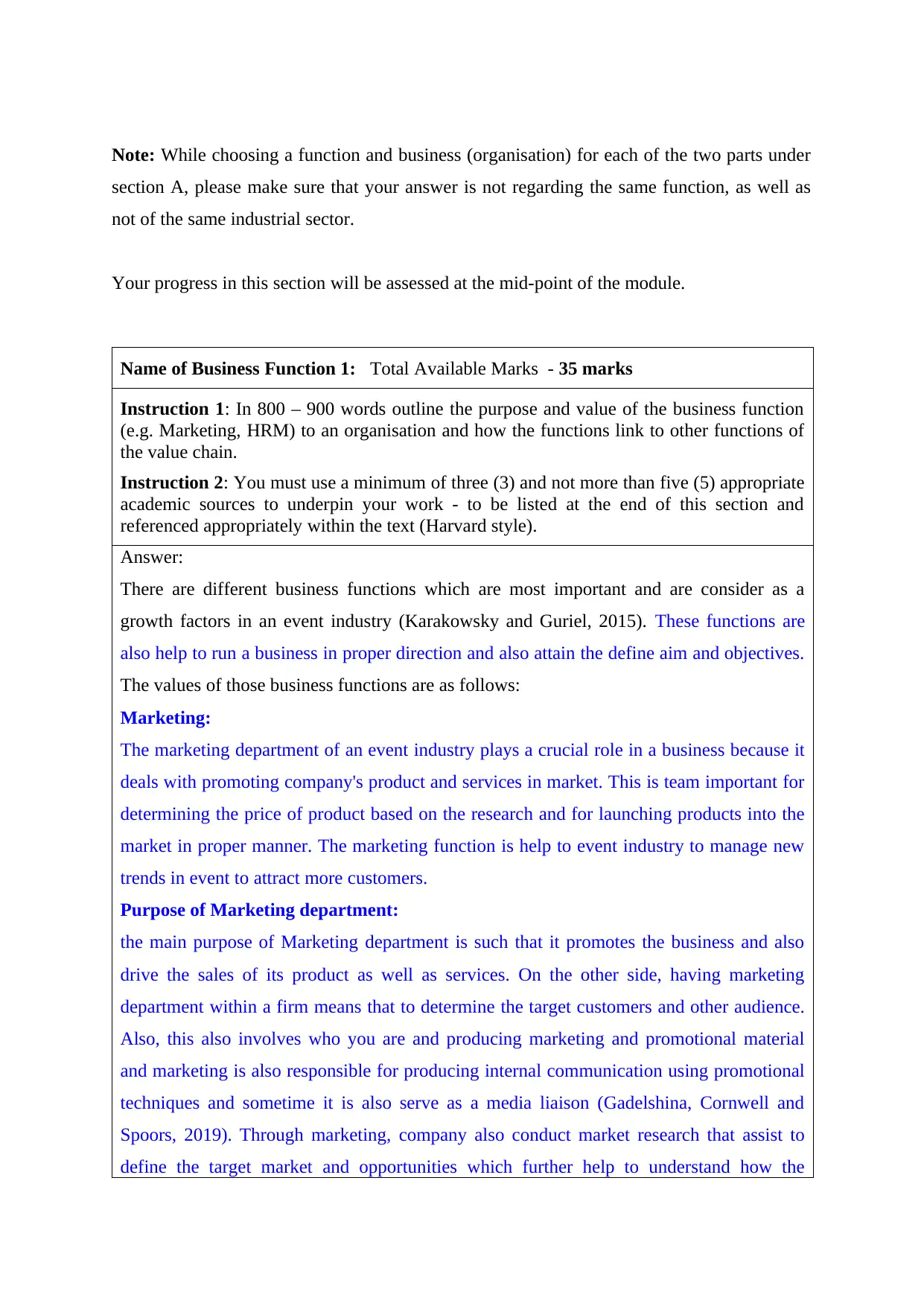
Note: While choosing a function and business (organisation) for each of the two parts under
section A, please make sure that your answer is not regarding the same function, as well as
not of the same industrial sector.
Your progress in this section will be assessed at the mid-point of the module.
Name of Business Function 1: Total Available Marks - 35 marks
Instruction 1: In 800 – 900 words outline the purpose and value of the business function
(e.g. Marketing, HRM) to an organisation and how the functions link to other functions of
the value chain.
Instruction 2: You must use a minimum of three (3) and not more than five (5) appropriate
academic sources to underpin your work - to be listed at the end of this section and
referenced appropriately within the text (Harvard style).
Answer:
There are different business functions which are most important and are consider as a
growth factors in an event industry (Karakowsky and Guriel, 2015). These functions are
also help to run a business in proper direction and also attain the define aim and objectives.
The values of those business functions are as follows:
Marketing:
The marketing department of an event industry plays a crucial role in a business because it
deals with promoting company's product and services in market. This is team important for
determining the price of product based on the research and for launching products into the
market in proper manner. The marketing function is help to event industry to manage new
trends in event to attract more customers.
Purpose of Marketing department:
the main purpose of Marketing department is such that it promotes the business and also
drive the sales of its product as well as services. On the other side, having marketing
department within a firm means that to determine the target customers and other audience.
Also, this also involves who you are and producing marketing and promotional material
and marketing is also responsible for producing internal communication using promotional
techniques and sometime it is also serve as a media liaison (Gadelshina, Cornwell and
Spoors, 2019). Through marketing, company also conduct market research that assist to
define the target market and opportunities which further help to understand how the
section A, please make sure that your answer is not regarding the same function, as well as
not of the same industrial sector.
Your progress in this section will be assessed at the mid-point of the module.
Name of Business Function 1: Total Available Marks - 35 marks
Instruction 1: In 800 – 900 words outline the purpose and value of the business function
(e.g. Marketing, HRM) to an organisation and how the functions link to other functions of
the value chain.
Instruction 2: You must use a minimum of three (3) and not more than five (5) appropriate
academic sources to underpin your work - to be listed at the end of this section and
referenced appropriately within the text (Harvard style).
Answer:
There are different business functions which are most important and are consider as a
growth factors in an event industry (Karakowsky and Guriel, 2015). These functions are
also help to run a business in proper direction and also attain the define aim and objectives.
The values of those business functions are as follows:
Marketing:
The marketing department of an event industry plays a crucial role in a business because it
deals with promoting company's product and services in market. This is team important for
determining the price of product based on the research and for launching products into the
market in proper manner. The marketing function is help to event industry to manage new
trends in event to attract more customers.
Purpose of Marketing department:
the main purpose of Marketing department is such that it promotes the business and also
drive the sales of its product as well as services. On the other side, having marketing
department within a firm means that to determine the target customers and other audience.
Also, this also involves who you are and producing marketing and promotional material
and marketing is also responsible for producing internal communication using promotional
techniques and sometime it is also serve as a media liaison (Gadelshina, Cornwell and
Spoors, 2019). Through marketing, company also conduct market research that assist to
define the target market and opportunities which further help to understand how the
Paraphrase This Document
Need a fresh take? Get an instant paraphrase of this document with our AI Paraphraser
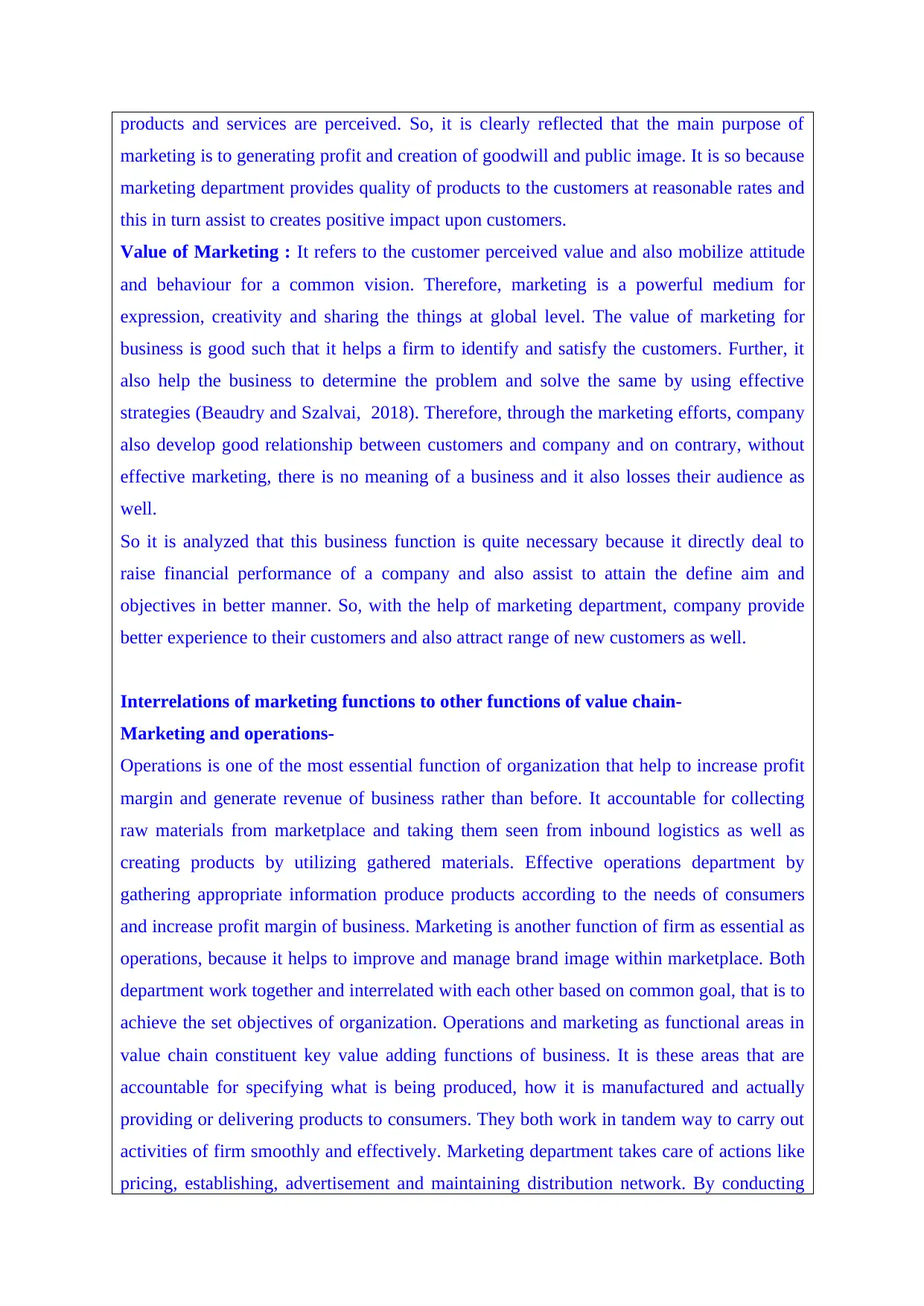
products and services are perceived. So, it is clearly reflected that the main purpose of
marketing is to generating profit and creation of goodwill and public image. It is so because
marketing department provides quality of products to the customers at reasonable rates and
this in turn assist to creates positive impact upon customers.
Value of Marketing : It refers to the customer perceived value and also mobilize attitude
and behaviour for a common vision. Therefore, marketing is a powerful medium for
expression, creativity and sharing the things at global level. The value of marketing for
business is good such that it helps a firm to identify and satisfy the customers. Further, it
also help the business to determine the problem and solve the same by using effective
strategies (Beaudry and Szalvai, 2018). Therefore, through the marketing efforts, company
also develop good relationship between customers and company and on contrary, without
effective marketing, there is no meaning of a business and it also losses their audience as
well.
So it is analyzed that this business function is quite necessary because it directly deal to
raise financial performance of a company and also assist to attain the define aim and
objectives in better manner. So, with the help of marketing department, company provide
better experience to their customers and also attract range of new customers as well.
Interrelations of marketing functions to other functions of value chain-
Marketing and operations-
Operations is one of the most essential function of organization that help to increase profit
margin and generate revenue of business rather than before. It accountable for collecting
raw materials from marketplace and taking them seen from inbound logistics as well as
creating products by utilizing gathered materials. Effective operations department by
gathering appropriate information produce products according to the needs of consumers
and increase profit margin of business. Marketing is another function of firm as essential as
operations, because it helps to improve and manage brand image within marketplace. Both
department work together and interrelated with each other based on common goal, that is to
achieve the set objectives of organization. Operations and marketing as functional areas in
value chain constituent key value adding functions of business. It is these areas that are
accountable for specifying what is being produced, how it is manufactured and actually
providing or delivering products to consumers. They both work in tandem way to carry out
activities of firm smoothly and effectively. Marketing department takes care of actions like
pricing, establishing, advertisement and maintaining distribution network. By conducting
marketing is to generating profit and creation of goodwill and public image. It is so because
marketing department provides quality of products to the customers at reasonable rates and
this in turn assist to creates positive impact upon customers.
Value of Marketing : It refers to the customer perceived value and also mobilize attitude
and behaviour for a common vision. Therefore, marketing is a powerful medium for
expression, creativity and sharing the things at global level. The value of marketing for
business is good such that it helps a firm to identify and satisfy the customers. Further, it
also help the business to determine the problem and solve the same by using effective
strategies (Beaudry and Szalvai, 2018). Therefore, through the marketing efforts, company
also develop good relationship between customers and company and on contrary, without
effective marketing, there is no meaning of a business and it also losses their audience as
well.
So it is analyzed that this business function is quite necessary because it directly deal to
raise financial performance of a company and also assist to attain the define aim and
objectives in better manner. So, with the help of marketing department, company provide
better experience to their customers and also attract range of new customers as well.
Interrelations of marketing functions to other functions of value chain-
Marketing and operations-
Operations is one of the most essential function of organization that help to increase profit
margin and generate revenue of business rather than before. It accountable for collecting
raw materials from marketplace and taking them seen from inbound logistics as well as
creating products by utilizing gathered materials. Effective operations department by
gathering appropriate information produce products according to the needs of consumers
and increase profit margin of business. Marketing is another function of firm as essential as
operations, because it helps to improve and manage brand image within marketplace. Both
department work together and interrelated with each other based on common goal, that is to
achieve the set objectives of organization. Operations and marketing as functional areas in
value chain constituent key value adding functions of business. It is these areas that are
accountable for specifying what is being produced, how it is manufactured and actually
providing or delivering products to consumers. They both work in tandem way to carry out
activities of firm smoothly and effectively. Marketing department takes care of actions like
pricing, establishing, advertisement and maintaining distribution network. By conducting
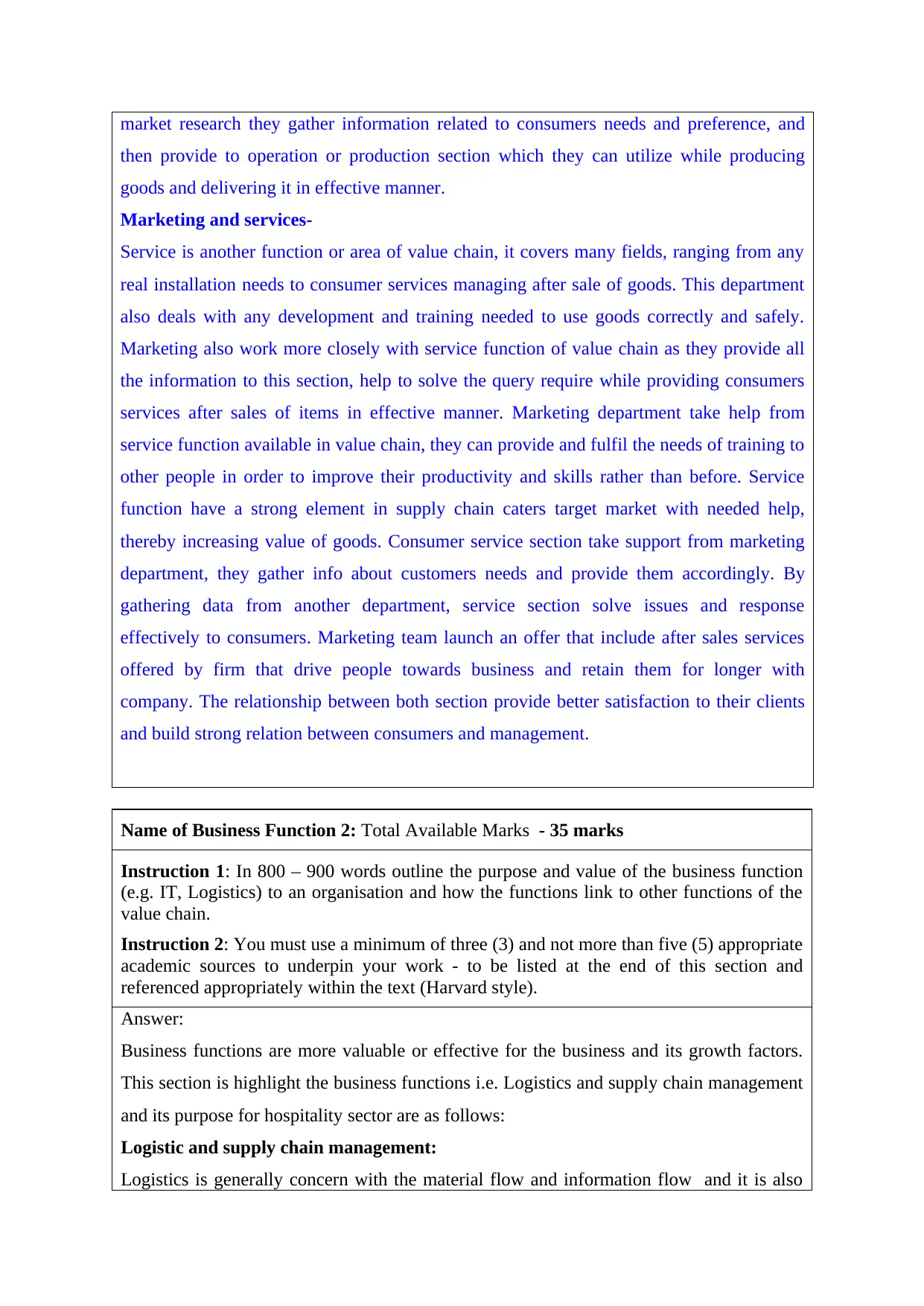
market research they gather information related to consumers needs and preference, and
then provide to operation or production section which they can utilize while producing
goods and delivering it in effective manner.
Marketing and services-
Service is another function or area of value chain, it covers many fields, ranging from any
real installation needs to consumer services managing after sale of goods. This department
also deals with any development and training needed to use goods correctly and safely.
Marketing also work more closely with service function of value chain as they provide all
the information to this section, help to solve the query require while providing consumers
services after sales of items in effective manner. Marketing department take help from
service function available in value chain, they can provide and fulfil the needs of training to
other people in order to improve their productivity and skills rather than before. Service
function have a strong element in supply chain caters target market with needed help,
thereby increasing value of goods. Consumer service section take support from marketing
department, they gather info about customers needs and provide them accordingly. By
gathering data from another department, service section solve issues and response
effectively to consumers. Marketing team launch an offer that include after sales services
offered by firm that drive people towards business and retain them for longer with
company. The relationship between both section provide better satisfaction to their clients
and build strong relation between consumers and management.
Name of Business Function 2: Total Available Marks - 35 marks
Instruction 1: In 800 – 900 words outline the purpose and value of the business function
(e.g. IT, Logistics) to an organisation and how the functions link to other functions of the
value chain.
Instruction 2: You must use a minimum of three (3) and not more than five (5) appropriate
academic sources to underpin your work - to be listed at the end of this section and
referenced appropriately within the text (Harvard style).
Answer:
Business functions are more valuable or effective for the business and its growth factors.
This section is highlight the business functions i.e. Logistics and supply chain management
and its purpose for hospitality sector are as follows:
Logistic and supply chain management:
Logistics is generally concern with the material flow and information flow and it is also
then provide to operation or production section which they can utilize while producing
goods and delivering it in effective manner.
Marketing and services-
Service is another function or area of value chain, it covers many fields, ranging from any
real installation needs to consumer services managing after sale of goods. This department
also deals with any development and training needed to use goods correctly and safely.
Marketing also work more closely with service function of value chain as they provide all
the information to this section, help to solve the query require while providing consumers
services after sales of items in effective manner. Marketing department take help from
service function available in value chain, they can provide and fulfil the needs of training to
other people in order to improve their productivity and skills rather than before. Service
function have a strong element in supply chain caters target market with needed help,
thereby increasing value of goods. Consumer service section take support from marketing
department, they gather info about customers needs and provide them accordingly. By
gathering data from another department, service section solve issues and response
effectively to consumers. Marketing team launch an offer that include after sales services
offered by firm that drive people towards business and retain them for longer with
company. The relationship between both section provide better satisfaction to their clients
and build strong relation between consumers and management.
Name of Business Function 2: Total Available Marks - 35 marks
Instruction 1: In 800 – 900 words outline the purpose and value of the business function
(e.g. IT, Logistics) to an organisation and how the functions link to other functions of the
value chain.
Instruction 2: You must use a minimum of three (3) and not more than five (5) appropriate
academic sources to underpin your work - to be listed at the end of this section and
referenced appropriately within the text (Harvard style).
Answer:
Business functions are more valuable or effective for the business and its growth factors.
This section is highlight the business functions i.e. Logistics and supply chain management
and its purpose for hospitality sector are as follows:
Logistic and supply chain management:
Logistics is generally concern with the material flow and information flow and it is also
⊘ This is a preview!⊘
Do you want full access?
Subscribe today to unlock all pages.

Trusted by 1+ million students worldwide
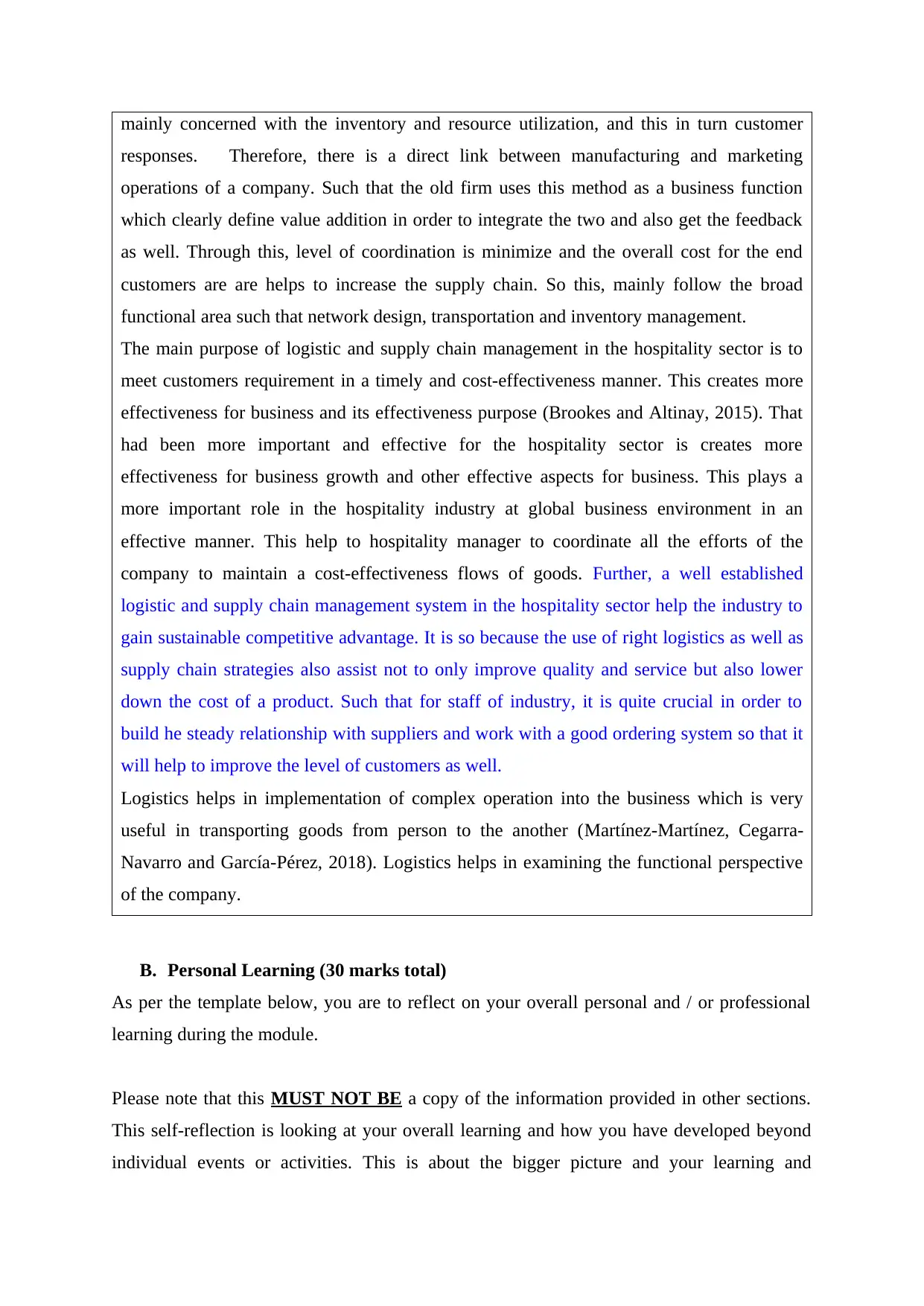
mainly concerned with the inventory and resource utilization, and this in turn customer
responses. Therefore, there is a direct link between manufacturing and marketing
operations of a company. Such that the old firm uses this method as a business function
which clearly define value addition in order to integrate the two and also get the feedback
as well. Through this, level of coordination is minimize and the overall cost for the end
customers are are helps to increase the supply chain. So this, mainly follow the broad
functional area such that network design, transportation and inventory management.
The main purpose of logistic and supply chain management in the hospitality sector is to
meet customers requirement in a timely and cost-effectiveness manner. This creates more
effectiveness for business and its effectiveness purpose (Brookes and Altinay, 2015). That
had been more important and effective for the hospitality sector is creates more
effectiveness for business growth and other effective aspects for business. This plays a
more important role in the hospitality industry at global business environment in an
effective manner. This help to hospitality manager to coordinate all the efforts of the
company to maintain a cost-effectiveness flows of goods. Further, a well established
logistic and supply chain management system in the hospitality sector help the industry to
gain sustainable competitive advantage. It is so because the use of right logistics as well as
supply chain strategies also assist not to only improve quality and service but also lower
down the cost of a product. Such that for staff of industry, it is quite crucial in order to
build he steady relationship with suppliers and work with a good ordering system so that it
will help to improve the level of customers as well.
Logistics helps in implementation of complex operation into the business which is very
useful in transporting goods from person to the another (Martínez-Martínez, Cegarra-
Navarro and García-Pérez, 2018). Logistics helps in examining the functional perspective
of the company.
B. Personal Learning (30 marks total)
As per the template below, you are to reflect on your overall personal and / or professional
learning during the module.
Please note that this MUST NOT BE a copy of the information provided in other sections.
This self-reflection is looking at your overall learning and how you have developed beyond
individual events or activities. This is about the bigger picture and your learning and
responses. Therefore, there is a direct link between manufacturing and marketing
operations of a company. Such that the old firm uses this method as a business function
which clearly define value addition in order to integrate the two and also get the feedback
as well. Through this, level of coordination is minimize and the overall cost for the end
customers are are helps to increase the supply chain. So this, mainly follow the broad
functional area such that network design, transportation and inventory management.
The main purpose of logistic and supply chain management in the hospitality sector is to
meet customers requirement in a timely and cost-effectiveness manner. This creates more
effectiveness for business and its effectiveness purpose (Brookes and Altinay, 2015). That
had been more important and effective for the hospitality sector is creates more
effectiveness for business growth and other effective aspects for business. This plays a
more important role in the hospitality industry at global business environment in an
effective manner. This help to hospitality manager to coordinate all the efforts of the
company to maintain a cost-effectiveness flows of goods. Further, a well established
logistic and supply chain management system in the hospitality sector help the industry to
gain sustainable competitive advantage. It is so because the use of right logistics as well as
supply chain strategies also assist not to only improve quality and service but also lower
down the cost of a product. Such that for staff of industry, it is quite crucial in order to
build he steady relationship with suppliers and work with a good ordering system so that it
will help to improve the level of customers as well.
Logistics helps in implementation of complex operation into the business which is very
useful in transporting goods from person to the another (Martínez-Martínez, Cegarra-
Navarro and García-Pérez, 2018). Logistics helps in examining the functional perspective
of the company.
B. Personal Learning (30 marks total)
As per the template below, you are to reflect on your overall personal and / or professional
learning during the module.
Please note that this MUST NOT BE a copy of the information provided in other sections.
This self-reflection is looking at your overall learning and how you have developed beyond
individual events or activities. This is about the bigger picture and your learning and
Paraphrase This Document
Need a fresh take? Get an instant paraphrase of this document with our AI Paraphraser
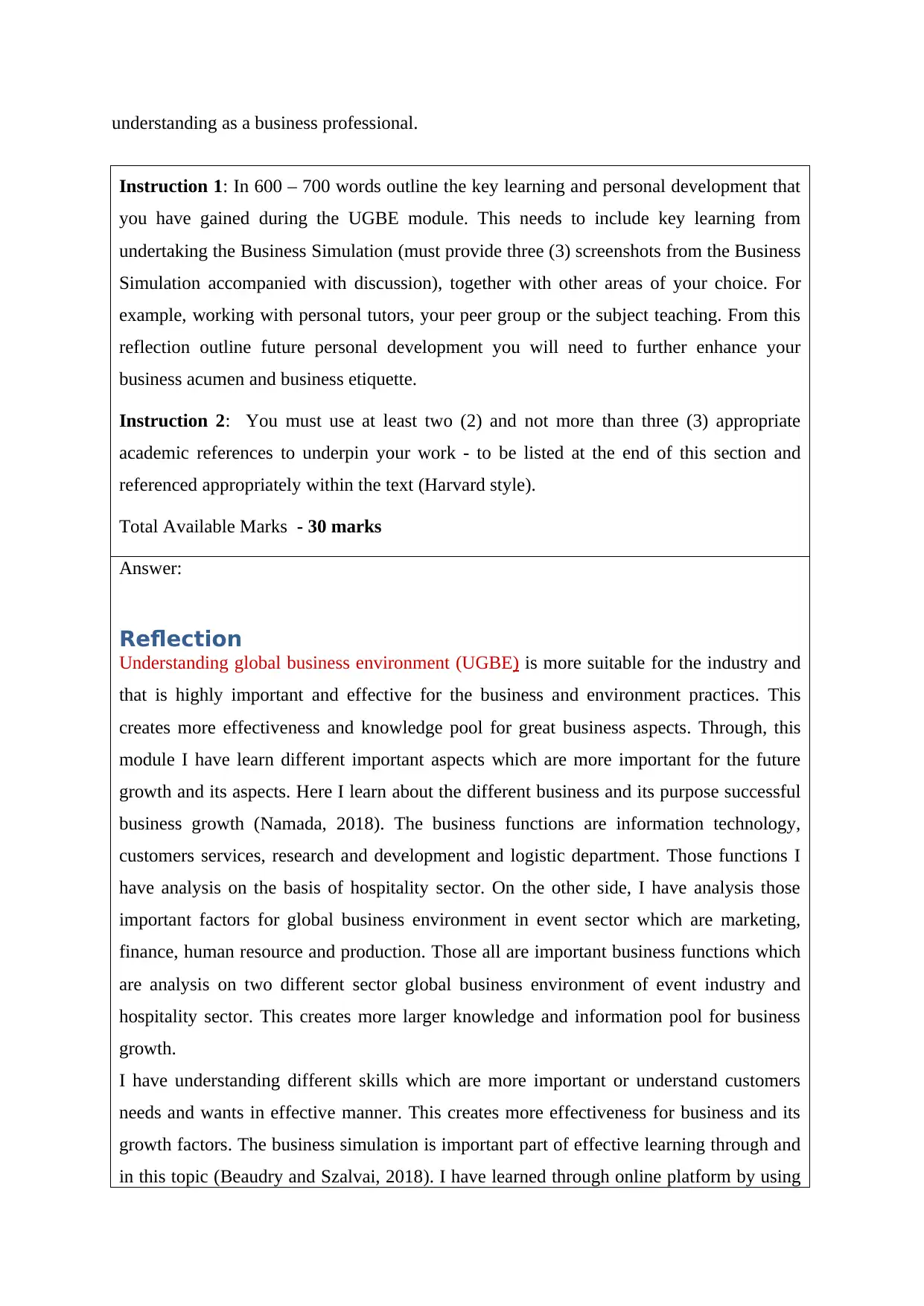
understanding as a business professional.
Instruction 1: In 600 – 700 words outline the key learning and personal development that
you have gained during the UGBE module. This needs to include key learning from
undertaking the Business Simulation (must provide three (3) screenshots from the Business
Simulation accompanied with discussion), together with other areas of your choice. For
example, working with personal tutors, your peer group or the subject teaching. From this
reflection outline future personal development you will need to further enhance your
business acumen and business etiquette.
Instruction 2: You must use at least two (2) and not more than three (3) appropriate
academic references to underpin your work - to be listed at the end of this section and
referenced appropriately within the text (Harvard style).
Total Available Marks - 30 marks
Answer:
Reflection
Understanding global business environment (UGBE) is more suitable for the industry and
that is highly important and effective for the business and environment practices. This
creates more effectiveness and knowledge pool for great business aspects. Through, this
module I have learn different important aspects which are more important for the future
growth and its aspects. Here I learn about the different business and its purpose successful
business growth (Namada, 2018). The business functions are information technology,
customers services, research and development and logistic department. Those functions I
have analysis on the basis of hospitality sector. On the other side, I have analysis those
important factors for global business environment in event sector which are marketing,
finance, human resource and production. Those all are important business functions which
are analysis on two different sector global business environment of event industry and
hospitality sector. This creates more larger knowledge and information pool for business
growth.
I have understanding different skills which are more important or understand customers
needs and wants in effective manner. This creates more effectiveness for business and its
growth factors. The business simulation is important part of effective learning through and
in this topic (Beaudry and Szalvai, 2018). I have learned through online platform by using
Instruction 1: In 600 – 700 words outline the key learning and personal development that
you have gained during the UGBE module. This needs to include key learning from
undertaking the Business Simulation (must provide three (3) screenshots from the Business
Simulation accompanied with discussion), together with other areas of your choice. For
example, working with personal tutors, your peer group or the subject teaching. From this
reflection outline future personal development you will need to further enhance your
business acumen and business etiquette.
Instruction 2: You must use at least two (2) and not more than three (3) appropriate
academic references to underpin your work - to be listed at the end of this section and
referenced appropriately within the text (Harvard style).
Total Available Marks - 30 marks
Answer:
Reflection
Understanding global business environment (UGBE) is more suitable for the industry and
that is highly important and effective for the business and environment practices. This
creates more effectiveness and knowledge pool for great business aspects. Through, this
module I have learn different important aspects which are more important for the future
growth and its aspects. Here I learn about the different business and its purpose successful
business growth (Namada, 2018). The business functions are information technology,
customers services, research and development and logistic department. Those functions I
have analysis on the basis of hospitality sector. On the other side, I have analysis those
important factors for global business environment in event sector which are marketing,
finance, human resource and production. Those all are important business functions which
are analysis on two different sector global business environment of event industry and
hospitality sector. This creates more larger knowledge and information pool for business
growth.
I have understanding different skills which are more important or understand customers
needs and wants in effective manner. This creates more effectiveness for business and its
growth factors. The business simulation is important part of effective learning through and
in this topic (Beaudry and Szalvai, 2018). I have learned through online platform by using
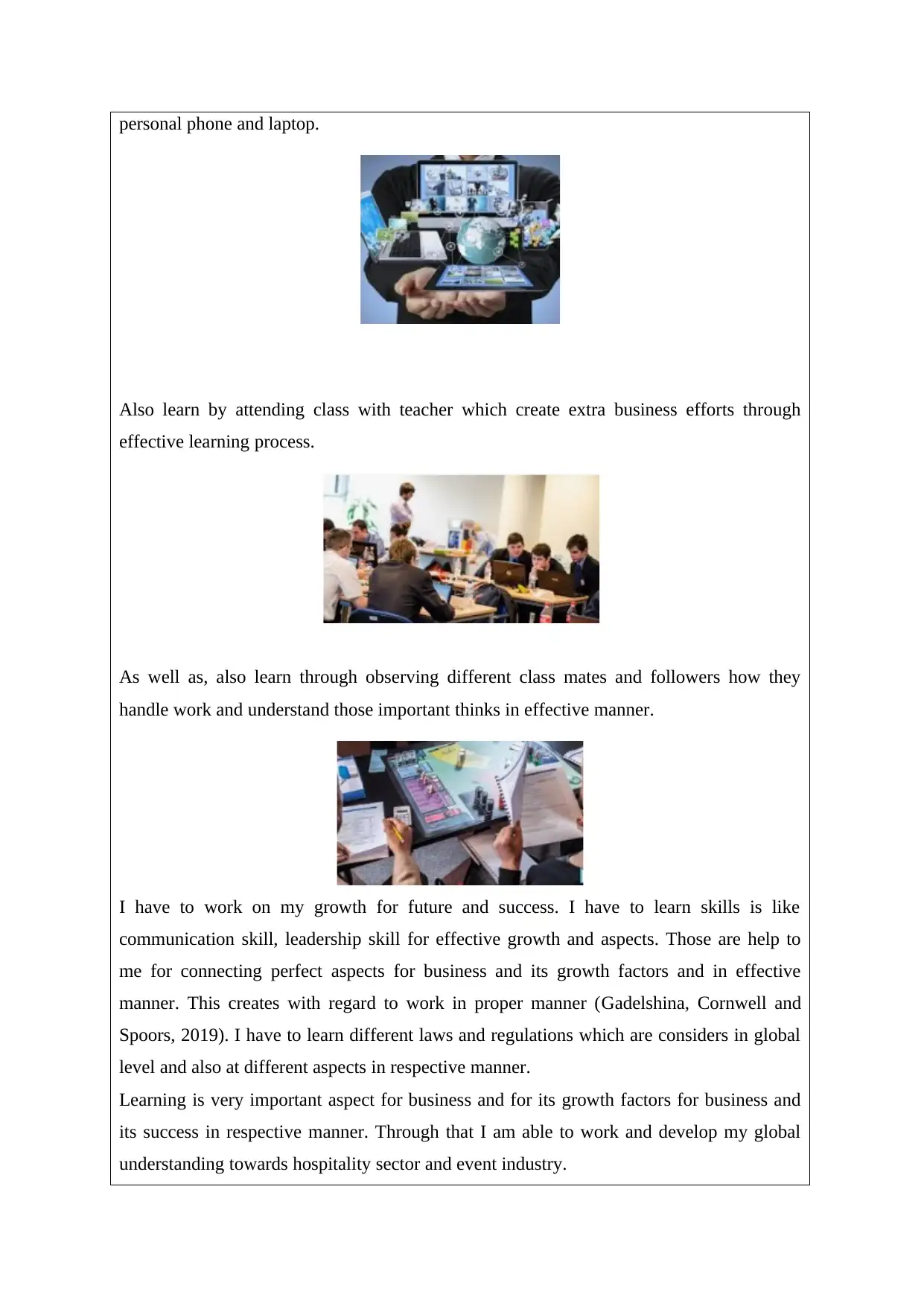
personal phone and laptop.
Also learn by attending class with teacher which create extra business efforts through
effective learning process.
As well as, also learn through observing different class mates and followers how they
handle work and understand those important thinks in effective manner.
I have to work on my growth for future and success. I have to learn skills is like
communication skill, leadership skill for effective growth and aspects. Those are help to
me for connecting perfect aspects for business and its growth factors and in effective
manner. This creates with regard to work in proper manner (Gadelshina, Cornwell and
Spoors, 2019). I have to learn different laws and regulations which are considers in global
level and also at different aspects in respective manner.
Learning is very important aspect for business and for its growth factors for business and
its success in respective manner. Through that I am able to work and develop my global
understanding towards hospitality sector and event industry.
Also learn by attending class with teacher which create extra business efforts through
effective learning process.
As well as, also learn through observing different class mates and followers how they
handle work and understand those important thinks in effective manner.
I have to work on my growth for future and success. I have to learn skills is like
communication skill, leadership skill for effective growth and aspects. Those are help to
me for connecting perfect aspects for business and its growth factors and in effective
manner. This creates with regard to work in proper manner (Gadelshina, Cornwell and
Spoors, 2019). I have to learn different laws and regulations which are considers in global
level and also at different aspects in respective manner.
Learning is very important aspect for business and for its growth factors for business and
its success in respective manner. Through that I am able to work and develop my global
understanding towards hospitality sector and event industry.
⊘ This is a preview!⊘
Do you want full access?
Subscribe today to unlock all pages.

Trusted by 1+ million students worldwide

Paraphrase This Document
Need a fresh take? Get an instant paraphrase of this document with our AI Paraphraser
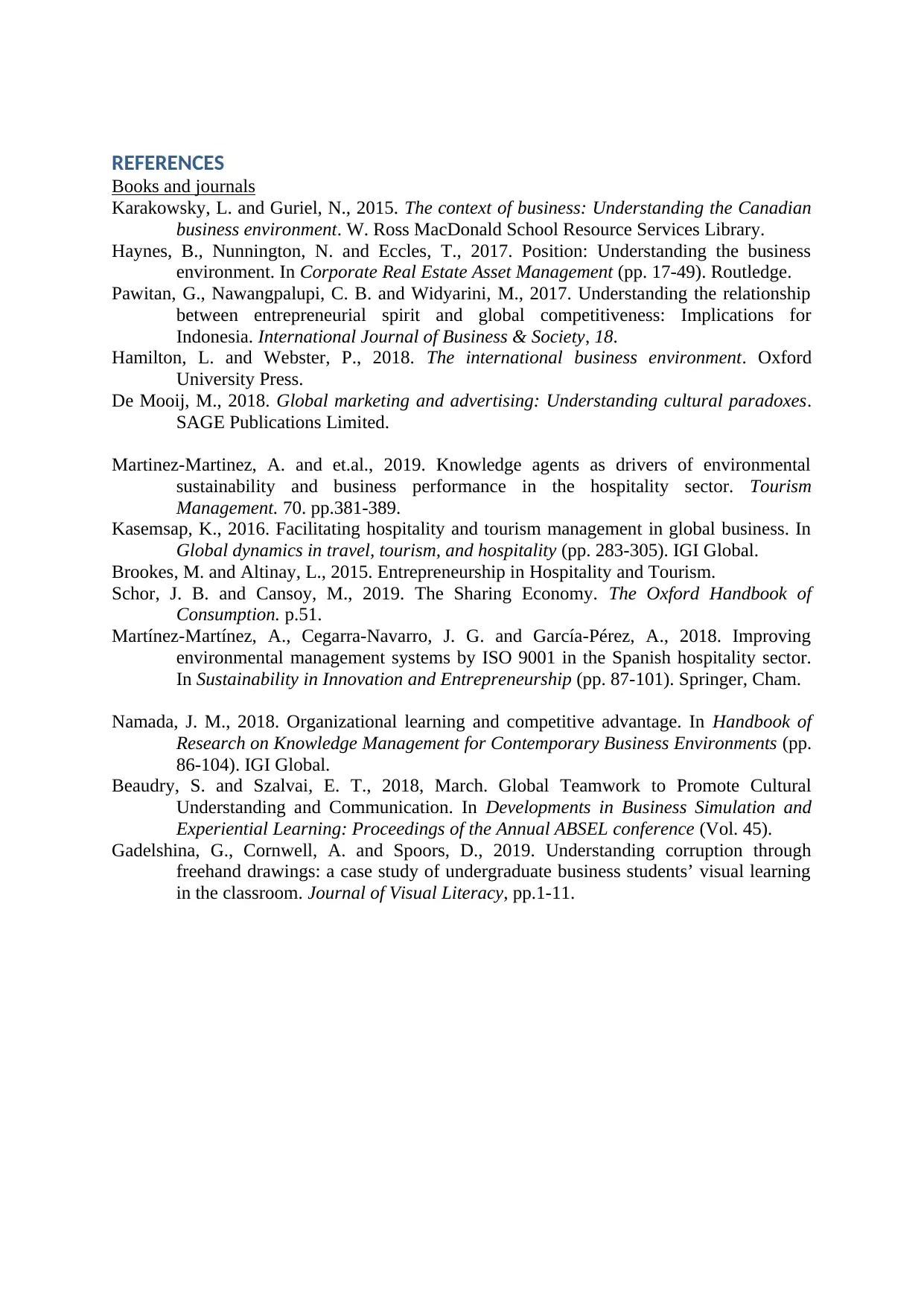
REFERENCES
Books and journals
Karakowsky, L. and Guriel, N., 2015. The context of business: Understanding the Canadian
business environment. W. Ross MacDonald School Resource Services Library.
Haynes, B., Nunnington, N. and Eccles, T., 2017. Position: Understanding the business
environment. In Corporate Real Estate Asset Management (pp. 17-49). Routledge.
Pawitan, G., Nawangpalupi, C. B. and Widyarini, M., 2017. Understanding the relationship
between entrepreneurial spirit and global competitiveness: Implications for
Indonesia. International Journal of Business & Society, 18.
Hamilton, L. and Webster, P., 2018. The international business environment. Oxford
University Press.
De Mooij, M., 2018. Global marketing and advertising: Understanding cultural paradoxes.
SAGE Publications Limited.
Martinez-Martinez, A. and et.al., 2019. Knowledge agents as drivers of environmental
sustainability and business performance in the hospitality sector. Tourism
Management. 70. pp.381-389.
Kasemsap, K., 2016. Facilitating hospitality and tourism management in global business. In
Global dynamics in travel, tourism, and hospitality (pp. 283-305). IGI Global.
Brookes, M. and Altinay, L., 2015. Entrepreneurship in Hospitality and Tourism.
Schor, J. B. and Cansoy, M., 2019. The Sharing Economy. The Oxford Handbook of
Consumption. p.51.
Martínez-Martínez, A., Cegarra-Navarro, J. G. and García-Pérez, A., 2018. Improving
environmental management systems by ISO 9001 in the Spanish hospitality sector.
In Sustainability in Innovation and Entrepreneurship (pp. 87-101). Springer, Cham.
Namada, J. M., 2018. Organizational learning and competitive advantage. In Handbook of
Research on Knowledge Management for Contemporary Business Environments (pp.
86-104). IGI Global.
Beaudry, S. and Szalvai, E. T., 2018, March. Global Teamwork to Promote Cultural
Understanding and Communication. In Developments in Business Simulation and
Experiential Learning: Proceedings of the Annual ABSEL conference (Vol. 45).
Gadelshina, G., Cornwell, A. and Spoors, D., 2019. Understanding corruption through
freehand drawings: a case study of undergraduate business students’ visual learning
in the classroom. Journal of Visual Literacy, pp.1-11.
Books and journals
Karakowsky, L. and Guriel, N., 2015. The context of business: Understanding the Canadian
business environment. W. Ross MacDonald School Resource Services Library.
Haynes, B., Nunnington, N. and Eccles, T., 2017. Position: Understanding the business
environment. In Corporate Real Estate Asset Management (pp. 17-49). Routledge.
Pawitan, G., Nawangpalupi, C. B. and Widyarini, M., 2017. Understanding the relationship
between entrepreneurial spirit and global competitiveness: Implications for
Indonesia. International Journal of Business & Society, 18.
Hamilton, L. and Webster, P., 2018. The international business environment. Oxford
University Press.
De Mooij, M., 2018. Global marketing and advertising: Understanding cultural paradoxes.
SAGE Publications Limited.
Martinez-Martinez, A. and et.al., 2019. Knowledge agents as drivers of environmental
sustainability and business performance in the hospitality sector. Tourism
Management. 70. pp.381-389.
Kasemsap, K., 2016. Facilitating hospitality and tourism management in global business. In
Global dynamics in travel, tourism, and hospitality (pp. 283-305). IGI Global.
Brookes, M. and Altinay, L., 2015. Entrepreneurship in Hospitality and Tourism.
Schor, J. B. and Cansoy, M., 2019. The Sharing Economy. The Oxford Handbook of
Consumption. p.51.
Martínez-Martínez, A., Cegarra-Navarro, J. G. and García-Pérez, A., 2018. Improving
environmental management systems by ISO 9001 in the Spanish hospitality sector.
In Sustainability in Innovation and Entrepreneurship (pp. 87-101). Springer, Cham.
Namada, J. M., 2018. Organizational learning and competitive advantage. In Handbook of
Research on Knowledge Management for Contemporary Business Environments (pp.
86-104). IGI Global.
Beaudry, S. and Szalvai, E. T., 2018, March. Global Teamwork to Promote Cultural
Understanding and Communication. In Developments in Business Simulation and
Experiential Learning: Proceedings of the Annual ABSEL conference (Vol. 45).
Gadelshina, G., Cornwell, A. and Spoors, D., 2019. Understanding corruption through
freehand drawings: a case study of undergraduate business students’ visual learning
in the classroom. Journal of Visual Literacy, pp.1-11.
1 out of 11
Related Documents
Your All-in-One AI-Powered Toolkit for Academic Success.
+13062052269
info@desklib.com
Available 24*7 on WhatsApp / Email
![[object Object]](/_next/static/media/star-bottom.7253800d.svg)
Unlock your academic potential
Copyright © 2020–2025 A2Z Services. All Rights Reserved. Developed and managed by ZUCOL.




